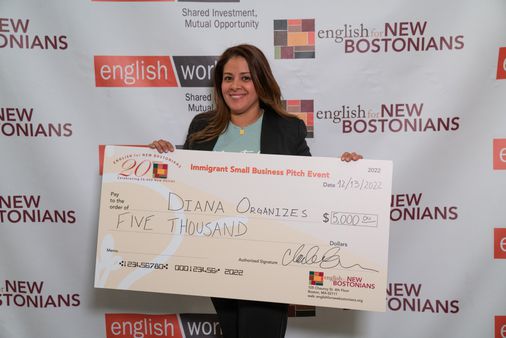Given those stark statistics, Massachusetts policymakers must be doing everything they can to foster immigrant entrepreneurship. They must focus on removing obstacles for immigrants to start their own businesses.
The lack of English language proficiency stands out among those barriers. Roughly 40 percent of the state’s immigrant population age 5 and older speaks English less than very well, according to 2019 data. That figure jumps to 49 percent for immigrants who are noncitizens.
Diana Potosi, an immigrant from Colombia who moved to Haverhill in 2015, is familiar with the language barrier. Potosi, 45, started working as a housecleaner in the Merrimack Valley area but had always wanted to launch her own business. At that time, the concept of professional organizing was popular after the Netflix series by Marie Kondo, the Japanese organizing consultant. “The way my grandmothers raised me was all about organization and order,” Potosi said in an interview in Spanish. She realized she could capitalize on the “Marie Kondo boom,” so she launched Diana Organizes LLC, offering residential and commercial decluttering systems and proper storage in spaces like closets, pantries and garages.
Advertisement
Potosi, however, lacked English language proficiency. For the first couple of years, all her clients were Spanish speakers. “The challenge was to translate everything — my mission, my vision — into English,” Potosi said. She said that on a scale of 1 to 10, she would rank her English abilities back then at 3.
Enter English for New Bostonians, the nonprofit that always seems to be punching above its weight. Through partnerships, grants, and fundraising, the organization creates English as a Second Language programs that are free or low-cost, serving more than 1,000 immigrants each year. Realizing that the lack of English language skills was threatening the ability of some immigrant business owners to survive and grow, English for New Bostonians launched an English course tailored to entrepreneurs in 2015 called English for Entrepreneurs, or E4E. Since then, about 150 immigrants have taken the course, according to Claudia Green, the nonprofit’s executive director.
Crucially, the E4E classes are flexible: Potential students are surveyed to determine their English level and the most convenient class time and location for them, according to Green. The course consists of two-hour classes typically held twice a week for four to five months.
Potosi learned about E4E through her involvement in a Spanish-language business accelerator program in Lawrence. She signed up for the E4E class in 2021, offered at the Gardner Pilot Academy Adult Education Program. During the course, Potosi learned how to write a business plan, as well as finance, customer service, and marketing concepts. She is now a certified professional organizer, and has one contractor and one part-time employee. Roughly 70 percent of Potosi’s clients are English speakers.
Last week, as part of English for New Bostonians’ 20-year anniversary celebration, the organization held a small-business pitch modeled after “Shark Tank,” the reality TV show for entrepreneurs. Six recent graduates of E4E classes competed for a $5,000 prize.
Potosi won with a simple but compelling pitch. About 10 million working moms in the country are suffering from burnout, she said. “Time is precious for working moms,” Potosi added at the event last week. Moreover, Potosi said that there are a lot of housecleaners who have the potential to become professional organizers and offer luxury services, like she did herself. “I want to build an online platform” to teach them how, she said. She plans to start at the end of next month in a rented space in Lawrence.
Beyond the immediate effect of being able to attract a larger customer base, these English courses have the potential for having an impact beyond the classroom. “What’s great about these classes is that they end up creating a community of immigrant business owners who help each other,” Green said. “They share information and tips, and they build confidence together.”
It’s clear that immigrant entrepreneurship plays a big role in the success of the Massachusetts economy. Expanding programs like E4E is a no-brainer. English for New Bostonians doesn’t have a big budget — $3.3 million a year, according to Green. Imagine what the nonprofit could do with double or triple that money to increase English language proficiency for immigrants.
This content was originally published here.



